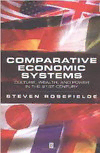
Comparative Economic Systems: Culture, Wealth, and Power in the 21st Century PDF
293 Pages·2002·1.497 MB·English
Most books are stored in the elastic cloud where traffic is expensive. For this reason, we have a limit on daily download.
Preview Comparative Economic Systems: Culture, Wealth, and Power in the 21st Century
Description:
Comparative Economic Systems: Culture, Wealth and Power in the 21st Century explains how culture, in various guises, modifies the standard rules of economic engagement, creating systems that differ markedly from those predicted by the theory of general market competition. This analysis is grounded in established principles, but also assumes that individual utility seeking may be culturally determined, that political goals may take precedence over public well being, and that business misconduct may be socially detrimental. The book clarifies conceptual misunderstandings about the comparative merit of free competition and perfect governance, showing in many cases how the same results are attainable using either mechanism, or by combining them. It illuminates why engineering variables like the quantity and quality of fixed and variable inputs, management, entrepreneurship, technological progress, and economic governance don't adequately explain disorders like the increasing poverty of the world's poorest nations.End of chapter questions and an extensive glossary enhance the book's utility and enable readers to fully comprehend the key features of each chapter.
See more
The list of books you might like
Most books are stored in the elastic cloud where traffic is expensive. For this reason, we have a limit on daily download.
